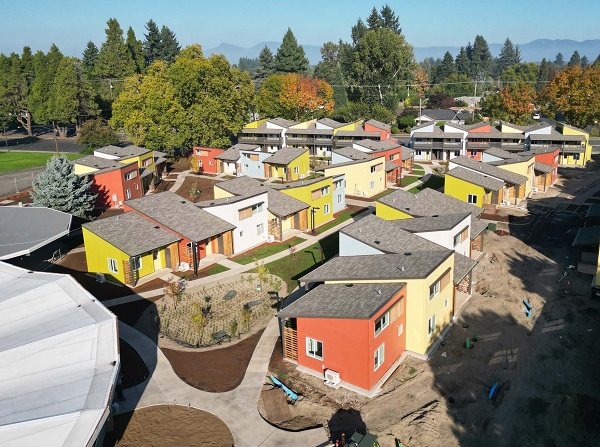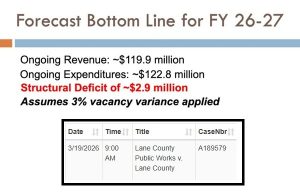City report highlights affordable housing fund
2 min read
from Lindsay Selser, Eugene Planning and Development Department
Eugene’s affordable housing trust fund helped prevent 100 local households from becoming homeless during the pandemic, is helping to construct 178 new affordable housing units, and is expected to provide emergency rent relief funds to another 110 households in the coming year.
The city’s construction excise tax, which collects 0.5% from the construction of new structures and additions to existing structures in Eugene, is dedicated to the affordable housing trust fund.
Funded projects were recently highlighted in the city’s “Two Year Program Review: FY22 & FY23.“
With $3.3 million generated for local affordable housing since the construction excise tax was established in 2019, the city used $2.3 million to help obtain $45 million for construction of 178 new units:
- Peace Village Cooperative – new construction of 70 owner-occupied tiny homes for low-income households ($670,000).
- Grant Street Grow Homes – new construction of four new homes that will be available for purchase by low-income households ($321,528).
- Williams Place – new construction of 10 units of transitional housing for veterans experiencing homelessness ($350,000).
- The Coleman – new construction of a mixed-use development of 38 apartments and on-site support services for people with conviction histories ($552,650).
- Bridges on Broadway – conversion of a former hotel into 56 units of permanent supportive housing serving people experiencing chronic homelessness ($383,434).
In addition to the $2.3 million used to support new housing units, $1 million was allocated to prevent homelessness and to help low-income households become new homeowners:
- Direct service funds of $488,000 played a pivotal role in keeping over 100 local families and individuals in their homes during the pandemic, offering rental assistance and foreclosure prevention.
- An additional $290,000 in emergency rent relief funds will assist an estimated 110 Eugene households in maintaining housing over the next year.
- Affirmatively marketed to BIPOC households, $281,000 in down payment assistance is empowering low-income households to purchase homes in Eugene.
Since its creation, the fund has supported outcomes to increase affordable housing options for lower-income community members. These efforts align with goals in the city’s Housing Implementation Pipeline, a framework adopted by the city in 2022.
A nine-member advisory committee of community members plays a crucial role in advising city staff on the allocation of funds and recommending projects. Members include John Barofsky, Ibrahim Coulibaly, Alan Evans, Pete Knox, Kaarin Knudson, Jason Lear (Chair), Carmel Perez Snyder, Sarah Pishioneri, and Jennifer Volem (Co-Chair).
The city council makes the final decision on development awards.
A copy of the full report as well as additional information on the supported projects is available on the City’s website: eugene-or.gov/affordablehousingfund.







